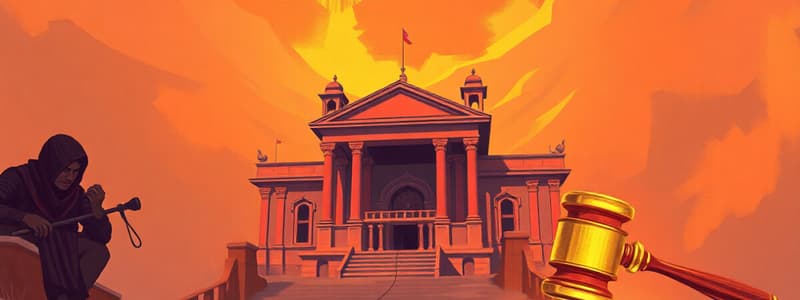Podcast
Questions and Answers
Which court is authorized to transfer proceedings under the Indian Succession Act, 1925 to a Civil Judge?
Which court is authorized to transfer proceedings under the Indian Succession Act, 1925 to a Civil Judge?
- A Civil Court
- The High Court
- The District Judge (correct)
- The Supreme Court
Under the Himachal Pradesh Courts Act, which authority can withdraw proceedings from a Civil Judge?
Under the Himachal Pradesh Courts Act, which authority can withdraw proceedings from a Civil Judge?
- The District Judge (correct)
- The State Government
- The Supreme Court
- The High Court
According to the act, which body has the power to determine the locations where a court will sit?
According to the act, which body has the power to determine the locations where a court will sit?
- The Local Municipality
- The State Government
- The High Court (correct)
- The District Judge
Who exercises general control over all Civil Courts within the local limits of their jurisdiction, subject to the High Court's superintendence?
Who exercises general control over all Civil Courts within the local limits of their jurisdiction, subject to the High Court's superintendence?
Who is responsible for distributing civil business among courts under their control?
Who is responsible for distributing civil business among courts under their control?
Who appoints the ministerial officers of the District Court, other than the Superintendent?
Who appoints the ministerial officers of the District Court, other than the Superintendent?
Who appoints the Superintendent of the District Court?
Who appoints the Superintendent of the District Court?
According to the act, can the place where a court sits be beyond the local limits of its jurisdiction?
According to the act, can the place where a court sits be beyond the local limits of its jurisdiction?
Flashcards
What legal matters can a District Judge authorize a Civil Judge to handle?
What legal matters can a District Judge authorize a Civil Judge to handle?
The District Judge can authorize a Civil Judge to handle specific legal matters, such as cases under the Indian Succession Act, Guardians and Wards Act, and the Provincial Insolvency Act.
How can the District Judge manage cases initially assigned to a Civil Judge?
How can the District Judge manage cases initially assigned to a Civil Judge?
The District Judge has the power to take back any proceedings initially assigned to a Civil Judge and either handle them directly or transfer them to another competent court.
How do the proceedings handled by a Civil Judge align with the District Judge's court?
How do the proceedings handled by a Civil Judge align with the District Judge's court?
A Civil Judge handles legal matters as directed by the District Judge, adhering to the rules and procedures used by the District Judge's Court.
Who determines the location of a court under the Himachal Pradesh Courts Act?
Who determines the location of a court under the Himachal Pradesh Courts Act?
Signup and view all the flashcards
Can a court operate beyond its usual jurisdictional boundaries?
Can a court operate beyond its usual jurisdictional boundaries?
Signup and view all the flashcards
How is the hierarchy of control structured within the court system?
How is the hierarchy of control structured within the court system?
Signup and view all the flashcards
How does the District Judge distribute the workload amongst various courts?
How does the District Judge distribute the workload amongst various courts?
Signup and view all the flashcards
Who appoints the key personnel for the District Court?
Who appoints the key personnel for the District Court?
Signup and view all the flashcards
Study Notes
Himachal Pradesh Courts Act, 1976 - Key Provisions
-
Cognizance and Transfer of Proceedings:
- Any Civil Judge can take cognizance, and a District Judge can transfer proceedings related to:
- Indian Succession Act, 1925
- Guardians and Wards Act, 1890
- Provincial Insolvency Act, 1920
- District Judges can withdraw proceedings from a Civil Judge, dispose of them themselves, or transfer them to another competent court.
- Civil Judges, who handle transferred or initiated proceedings, must follow rules similar to the District Judge's court.
- Any Civil Judge can take cognizance, and a District Judge can transfer proceedings related to:
-
Court Locations:
- High Courts can set locations for courts under this Act (even outside the court's jurisdictional area).
- Courts can be held anywhere within their local jurisdiction, unless otherwise specified.
-
Court Control:
- District Judges oversee all Civil Courts within their jurisdiction, under the High Court's supervision.
-
Business Distribution:
- District Judges can distribute civil cases among courts under their control as they see fit, using written orders.
- This doesn't allow courts to exceed their jurisdiction.
-
Court Staff:
- District Judges appoint all ministerial court officers except the Superintendent.
- High Courts appoint the Superintendent of the District Court.
Studying That Suits You
Use AI to generate personalized quizzes and flashcards to suit your learning preferences.




